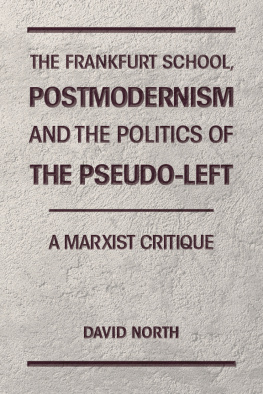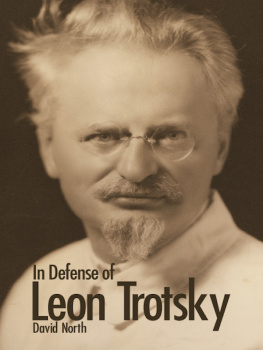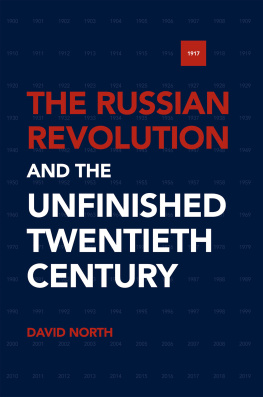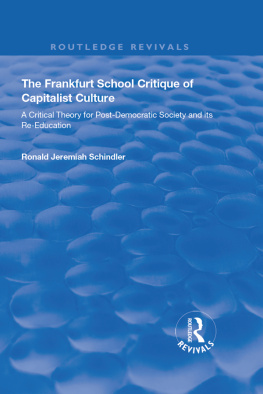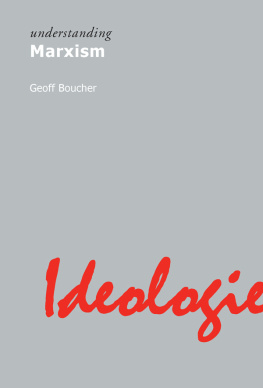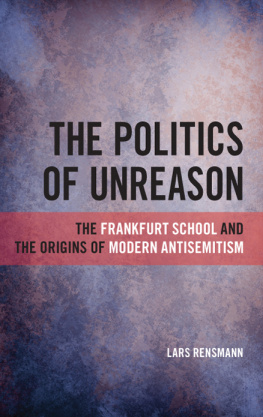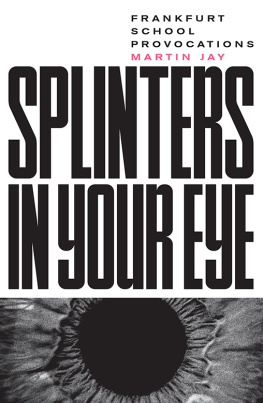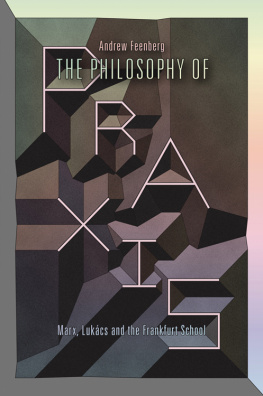David North - Frankfurt School and the Pseudo-Left: A Marxist Critique
Here you can read online David North - Frankfurt School and the Pseudo-Left: A Marxist Critique full text of the book (entire story) in english for free. Download pdf and epub, get meaning, cover and reviews about this ebook. year: 2015, publisher: Mehring Books, genre: Politics. Description of the work, (preface) as well as reviews are available. Best literature library LitArk.com created for fans of good reading and offers a wide selection of genres:
Romance novel
Science fiction
Adventure
Detective
Science
History
Home and family
Prose
Art
Politics
Computer
Non-fiction
Religion
Business
Children
Humor
Choose a favorite category and find really read worthwhile books. Enjoy immersion in the world of imagination, feel the emotions of the characters or learn something new for yourself, make an fascinating discovery.
- Book:Frankfurt School and the Pseudo-Left: A Marxist Critique
- Author:
- Publisher:Mehring Books
- Genre:
- Year:2015
- Rating:4 / 5
- Favourites:Add to favourites
- Your mark:
- 80
- 1
- 2
- 3
- 4
- 5
Frankfurt School and the Pseudo-Left: A Marxist Critique: summary, description and annotation
We offer to read an annotation, description, summary or preface (depends on what the author of the book "Frankfurt School and the Pseudo-Left: A Marxist Critique" wrote himself). If you haven't found the necessary information about the book — write in the comments, we will try to find it.
Frankfurt School and the Pseudo-Left: A Marxist Critique — read online for free the complete book (whole text) full work
Below is the text of the book, divided by pages. System saving the place of the last page read, allows you to conveniently read the book "Frankfurt School and the Pseudo-Left: A Marxist Critique" online for free, without having to search again every time where you left off. Put a bookmark, and you can go to the page where you finished reading at any time.
Font size:
Interval:
Bookmark:
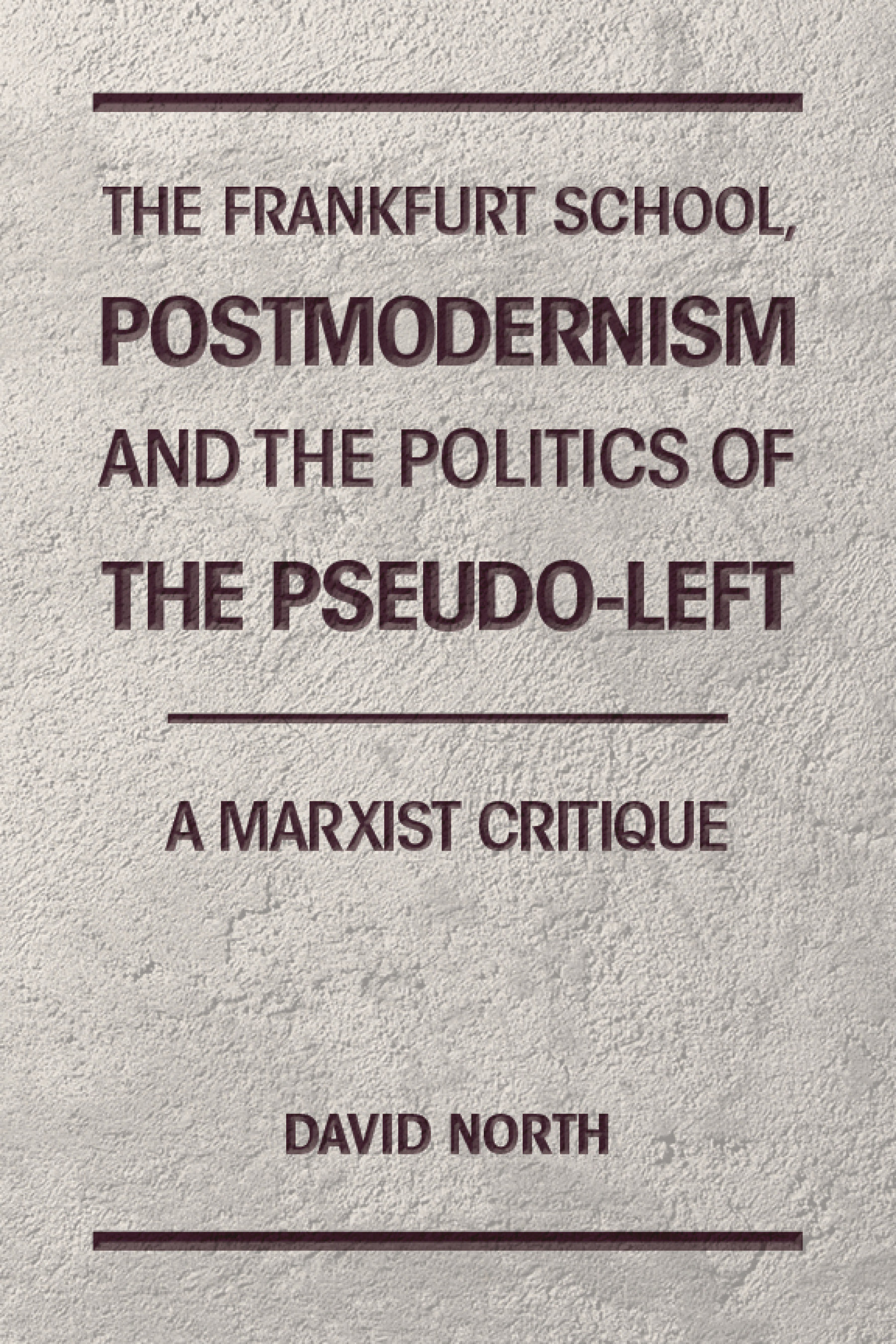
and the Politics of the Pseudo-Left
Mehring Books
Oak Park, Michigan
Library of Congress Cataloging-in-Publication Data
Names: North, David, 1950- author.
Title: The Frankfurt school, postmodernism and the politics of the
pseudo-left : a Marxist critique / David North.
Description: Oak Park, Michigan : Mehring Books, [2015] | Includes
bibliographical references and index.
Identifiers: LCCN 2015028879| ISBN 9781893638501 (pbk. : alk. paper) | ISBN 9781893638518 (iBook) | ISBN 9781893638525 (Kindle)
Subjects: LCSH: Historical materialism. | Frankfurt school of sociology. |
Postmodernism.
Classification: LCC D16.9 .N88 2015 | DDC 335.4/119--dc23
LC record available at http://lccn.loc.gov/201502887
Cover design: Kevin Reed
Plekhanov and the Tragedy
of the Second International
The Political and Intellectual Odyssey
of Alex Steiner
The Theoretical and Historical
Origins of the Pseudo-Left
It Was All Engels Fault:
A Review of Tom Rockmores
Marx After Marxism
This book examines the relationship between Marxist theory and the development of the revolutionary program, perspective and practice of the Trotskyist movement. Within this context, it explains why the International Committee of the Fourth International has devoted significant time and energy to exposing the reactionary character of the anti-materialist and anti-Marxist intellectual tendencies related to various branches of existentialist irrationalism, the Frankfurt School and postmodernism that provide the theoretical foundations for a wide array of present-day petty-bourgeois pseudo-left and anti-socialist political movements.
The most internationally prominent example of a pseudo-left organization is the Greek party, Syriza. The role played by the Syriza government, following its election in January 2015, in disorienting, demoralizing and betraying the mass anti-austerity movement, has provided a shameful demonstration of the political catastrophe that follows when this type of petty-bourgeois organization, spouting empty populist phrases, comes to power. In the aftermath of Syrizas criminal betrayal, with all its tragic consequences for the working people and youth of Greece, this volumes analysis of the intimate connection between contemporary forms of anti-Marxist theory and the reactionary class interests promoted by the pseudo-left is especially timely.
political pathology of petty-bourgeois pseudo-leftism
The first three documents in this volume were written in response to attacks on the theoretical foundations, perspective and practice of the Socialist Equality Party (US) and the International Committee of the Fourth International by two former members of the American Trotskyist movement, Alex Steiner and Frank Brenner. Given the fact that they both left the Workers League (predecessor of the SEP) in the late 1970s, their documents could have been ignored. Coming from individuals who had abandoned revolutionary activity more than a quarter-century earlier, the warnings of Steiner and Brenner that the SEP faced imminent ruin lacked political credibility, not to mention moral force. Their status as sympathizers a broad and vague self-designation that carried no specific responsibilities did not obligate the SEP to respond to their ever-expanding and increasingly vitriolic criticisms. However, two considerations persuaded the ICFI to reply.
First, as Steiner and Brenner had played a role in the early history of the Workers League, we sincerely hoped that a response to their criticisms would assist them in their own political development and, if at all possible, encourage their return to active involvement in the work of the revolutionary movement. It soon became clear that this was to be the least likely outcome of our efforts at clarification.
The second consideration concerned the theoretical content of the criticisms. Their principal documents On Why Utopia is Crucial to a Revival of Socialist Consciousness , Objectivism or Marxism and Marxism Without Its Head or Its Heart consisted of a compendium of anti-Marxist conceptions popular among broad layers of middle-class ex-radicals and academics.
While Steiner and Brenner declared that they were upholding the traditions of the International Committee, our analysis of their documents demonstrated that they drew their inspiration from figures such as Herbert Marcuse, the Freudo-Marxists Wilhelm Reich and Erich Fromm, and the utopian theorist Ernst Bloch.
As neither Steiner nor Brenner ever attempted to trace, critically and systematically, the theoretical and political sources of their own ideas (an obligatory element of dialectical materialist methodology), it may well be the case that they did not fully grasp the extent to which they were reproducing the arguments of several generations of anti-Marxists and opponents of historical materialism. There was nothing of an original character in their denunciations of objectivism, determinism, and vulgar materialism, their denigration of Plekhanovs intellectual legacy and of Lenins Materialism and Empirio-Criticism , their attack on the Enlightenment and Reason, their complaints against science and technology, their blurring of the distinction between materialism and idealism, their magnification of the significance of the unconscious and the power of the irrational, their focus on individual alienation as opposed to class exploitation, and their celebration of utopian mythmaking.
The first three documents are not only an answer to Steiner and Brenner. They are also directed against prevalent forms of anti-Marxism that exercise a reactionary influence on current political and cultural life, and which spare no effort in disorienting and demoralizing the working class, student youth and intellectuals.
Especially during the past decade, the connection has become much clearer between the reactionary pseudo-left politics of the middle class and the theories of Nietzsche, Brzozowski, Sorel, De Man, the Frankfurt School and the many forms of extreme philosophical subjectivism and irrationalism propagated by postmodernists (Foucault, Laclau, Badiou et al.). Pseudo-left politics centered on race, nationality, ethnicity, gender, and sexual preference has come to play a critical role in suppressing opposition to capitalism, by rejecting class as the essential social category and emphasizing, instead, personal identity and lifestyle, and by legitimizing imperialist interventions and wars in the name of human rights.
Theoretical conceptions do not develop in a historical, political and social vacuum. In 1911, in a review that answered an attack on historical materialism by Heinrich Rickert (18631936), a professor of philosophy at Freiburg University in Germany, the great Russian Marxist Georgi Plekhanov wrote:
The fact is that Rickert and other scientists like him do not have the foggiest notion of historical materialism, not for any personal reason, but because their intellectual field of vision is clouded by prejudices that are peculiar to a whole class . It might truly be said of them that the rubbish they offer as an exposition of historical materialism is determined by a completely unscientific political prejudice. Their aversion to historical materialism speaks most eloquently of their fear of specifically Social-Democratic aspirations.
Font size:
Interval:
Bookmark:
Similar books «Frankfurt School and the Pseudo-Left: A Marxist Critique»
Look at similar books to Frankfurt School and the Pseudo-Left: A Marxist Critique. We have selected literature similar in name and meaning in the hope of providing readers with more options to find new, interesting, not yet read works.
Discussion, reviews of the book Frankfurt School and the Pseudo-Left: A Marxist Critique and just readers' own opinions. Leave your comments, write what you think about the work, its meaning or the main characters. Specify what exactly you liked and what you didn't like, and why you think so.

